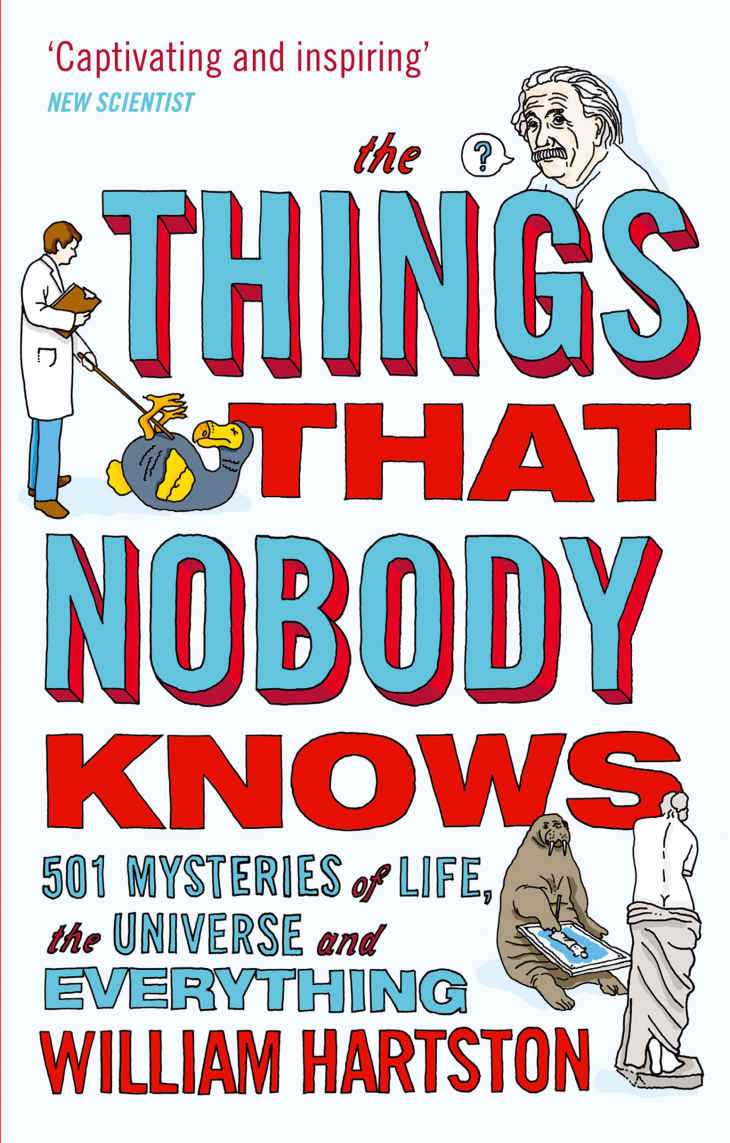
The Things That Nobody Knows
501 Mysteries of Life, the Universe and Everything
- اطلاعات
- نقد و بررسی
- دیدگاه کاربران
نقد و بررسی

April 1, 2013
With an epigraph from Thoreau about the necessity of ignorance for personal growth, it’s clear from the start of the book that it isn’t Hartson’s intention to clarify these 501 mysteries. He provides plenty of interesting information, but most of it comes in the form of speculation as to why certain questions—“At what speed did J.S. Bach intend his compositions to be played?”; “Why do narwhals have spiral tusks?”; “Is free will an illusion caused by quantum uncertainty?”; “Can yeast think”—remain (and in some cases will forever remain) unanswered. Readers looking for answers will be thwarted at every turn, but those hoping to learn a little more about what they don’t know have a reliable guide in Hartson, a Cambridge-educated mathematician, two-time British chess champ, industrial psychologist, and master question-asker. Hartson (The Encyclopedia of Useless Information) is admirably game to tackle any subject: biology, philosophy, history, geology, physics, fantasy—it’s all here, organized according to topic. With humor and an inquiring mind, he examines perennially confounding quandaries, and his investigations will surely pique the curiosity of kids and scholars alike.

May 15, 2013
Should you buy for your library a book with hundreds of questions to which no one knows the answer? If so, you should consider this clever and wry compendium, written by the ever-curious mathematician, writer, and psychologist Hartston. He's already done several similar, well-researched collections of seemingly "useless information." Yet these are the mysteries that could keep readers up at night--puzzling over information they didn't know that they didn't know. Confused? Well, it's that celebration of ignorance that makes this book both so much fun and such a conversation starter. While some topics and questions are quite obscure, there is plenty here to please any trivia enthusiast, scientific wonderer, or just the innocently ignorant (or, as it were, perpetually curious). Covering from aardvarks (do you share their DNA?) to zymology (much ado about yeast), the book takes a scientific look at a plethora of stuff you may never need to know, but once you scan the scintillating questions, you'll want to know more. In the midst of all our knowledge and education, how did we manage to overlook some of these questions--What was the origin of laughter? Who destroyed the nose of the Sphinx? Why are so many female albatrosses lesbian? Topics from the curious (sex, sports, religion) to the mundane (plankton, coffee, hair) are here--and Hartston provides humorous tidbits of historical information about each--piquing our interest but, alas, revealing that the real answer is...there is no answer. Verdict This book goes beyond pop culture interest to engage those truly interested in scientific taxonomies; it's one of those rare books patrons won't want to put down and will be talking about for hours around the water cooler. Significant YA appeal as well.--Sharon Verbeten, Brown Cty. Lib., Green Bay, WI
Copyright 2013 Library Journal, LLC Used with permission.

July 1, 2013
Billed as a collection of scrap knowledge, this book ponders 501 questions in a variety of categories. Science questions include Will disease ever be eradicated? and Is there a limit to how fast humans can run?; while history questions range from Did Neanderthals talk to each other? to Was Geoffrey Chaucer a rapist? and Where is the body of Glenn Miller? Musings and potential answers are presented in one to three paragraphs, making this a delightful collection for trivia buffs and browsers.(Reprinted with permission of Booklist, copyright 2013, American Library Association.)




دیدگاه کاربران